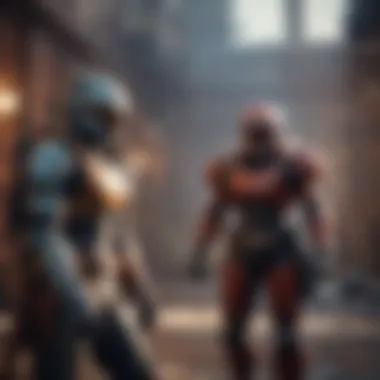Exploring Destiny 2 Trials: Features, Mechanics, and Strategies


Intro
Destiny 2 offers a myriad of experiences for players, but the Trials stand out as a pinnacle of competitive gameplay. Knowing the features and mechanics involved is essential for enthusiastic players looking to excel. This section begins an exploration of key elements, significant updates, and community impact, setting the stage for a deeper understanding of this pivotal game aspect.
Game Feature Spotlight
Unique Gameplay Mechanisms
The Trials of Osiris introduce a distinct competitive environment that tests players not only in skill but also in strategy. The matches revolve around a 3v3 elimination format, where teams compete to win a set number of rounds. Key to success is communication and teamwork. Revives and baiting opponent abilities are strategies often seen in top-tier play. Understanding the map layouts and the best positions can provide a significant edge.
Art Style and Design
Visually, Trials employ sharp contrasts and a darker aesthetic, reflecting the high stakes of the competition. Maps are crafted with minimalistic flair yet maximized functionality. The design enhances both player experience and matches leading to exciting encounters while maintaining an immersive visual atmosphere. This aesthetic speaks to the broader narratives in Destiny 2 while remaining contextual to the trials themselves.
Storyline and Characters
The backdrop is rich with lore, crafted around the enigmatic figure Osiris, who foresaw the impending Darkness. The significance of winning in Trials links closely back to the game's principal narrative themes. Participation gives players not just rewards, but lore tidbits that enrich understanding of Destiny's universe, creating a more invested player base. Bungie realizes that competitive content has the potential to deepen the connection between players and the unfolding Destiny narrative.
Understanding Trials of Osiris requires players to embrace both team dynamics and the broader game landscape, enhancing both enjoyment and strategic capacity.
Evolution of Trials
Since its inception, the Trials have undergone numerous changes. Each new season brings updated features aimed at improving player experience. Engaging with the Trials involves keeping abreast not just with gameplay mechanics, but also ongoing tactical shifts, player feedback, and evolving metas.
Community and Player Interaction
The Trials scene serves as a hub for community discussions and strategies. Online platforms, such as Reddit, host numerous discussions about effective strategies and team compositions. Subsequently, this community-driven aspect fosters a collaborative approach towards mastery of Trials among enthusiasts. Players often form teams outside the game environment, showcasing a dynamic interplay of virtual and actual friendships forged through competitive play.
Finale
In summary, the Trials within Destiny 2 serve as more than just a form of gaming competition. They encapsulate built-up struggle, camaraderie, and opportunities for players to engage deeply with both the mechanical frameworks and lore of the game. As the Trials continue to develop, it is imperative for players, both seasoned and newcomers, to stay informed on the ongoing changes and community trends.
This pathway to mastery not only elevates gameplay but enhances the richer narrative defining the Destiny 2 experience.
Understanding Trials in Destiny
The Trials in Destiny 2 represent some of the most intense competitive gameplay experiences players can engage in. Understanding this component is crucial for anyone looking to excel within the game. Trials attracts both casual players and fierce competitors, fostering a complex ecosystem full of achievements and challenges.
Determining how best to approach these trials is important, as they provide unique opportunities for reward, personal improvement, and community involvement.
Knowing about Trials also enables players to assess their skills against likes of other players. This element of comparison cultivates growth and push individuals to refine their strategies. Moreover, Trials feature a matchmaking system, elevating the need to grasp every aspect of selection and performance impact.
The Origins of Trials
Trials has its roots in earlier iterations of Destiny, where players craved structured yet competitive gameplay. Bungie's goal was to create a mode that rewards skill, teamwork, and determination. This desire culminated in the birth of Trials of Osiris, a fan-favorite activity that emphasizes the connection between player skill and overall game experience.
Events like these shaped the game's community by nurturing a sense of belonging among players. It formed an ideal ground to showcase not only one's proficiency but also tactical landmarks that can greatly influence the outcome. This aspect makes the origin story of Trials relevant, as it defines much of what players expect from high-stakes gameplay.
The Evolution of Game Mechanics
Over the years, Trials has evolved significantly. Game mechanics have adapted in response to player feedback and emerging gaming trends.
Originally, Trials relied on simpler rules and primitive matchmaking methods. However, improvements introduced features like better team coordination and performance tracking. For instance, a reward system encourages team players to work cohesively, enhancing the overall engagement and competitiveness.


Furthermore, adjustments to loadouts and meta choices have reformulated how players approach each match. Now, understanding weapon pairings and elemental interactions can influence victory. The transformation of Trials over time illustrates the necessity of adaptation in an ever-challenging environment and poses new obstacles for even seasoned veterans.
In summary, understanding the basics of Trials in Destiny 2 sets the stage for players to encounter a rich, robust gaming experience filled not only with competition but also nurturement.
Gameplay Dynamics
Understanding gameplay dynamics is central to mastering Trials in Destiny 2. The mechanics here serve as the backbone of matches and influence players’ performance in both competitive and cooperative elements. As players navigate through various match modes and formats, the interaction of game rules and player actions becomes crucial. Understanding these dynamics leads to improved decision-making and strategy execution.
Matchmaking Explained
Matchmaking is essential for maintaining competitiveness.As players engage in Trials, they are paired with others of similar skill. Each match's outcome hinges significantly on these pairings, impacting both individual experience and overall game enjoyment. Matchmaking systems utilize telemetry data, player stats, and win rates to gauge participant skill. Proper matchmaking ensures that players face opponents of comparable abilities.
However, it can create imbalance if the systems fail to approximate skill accurately. There are disagreements about whether players should face down skilled opponents or beginners, with advocates on both sides. A robust matchmaking algorithm demands constant adjustment for player satisfaction amid uproar over its efficiency.
Rounds and Victory Conditions
Trials are conducted in a best-of-five round format. To win, teams must secure three victories in rounds while ensuring defensive and offensive strategies advance their efforts. Each round requires players pay attention to elimination order, map location, and immaculate coordination.
Victory hinges on either team elimination or securing objectives. Understanding these mechanics shapes straightforward strategies:
- Defense: Teams often focus on protecting one another and minimizing casualties.
- Offense: Quick engagements and aggressive plays can sometimes tip games decisively in a team’s favor.
The synergies created in how teams respond to defeat or success fuel their journey throughout an entire match.
Player Roles and Team Composition
Trial scenarios emphasize team formation. Developers pen highly nuanced games, reflecting in played roles like defender, flanker, support, and aggressive attack. Each role fulfills vital functions during warfare, conversing relational skills in the heat of the battlefield. As mentioned, effective communication borders traditional roles in gaming today.
Teams primarily aim to fill these roles:
- Defender: Temporary coordinates effectively prevent opponent Vaporization.
- Flanker: Serpentine movements disrupt enemy formations.
- Support: Healers assist fellows and provide strategic insights.
- Aggressor: Brings threads of pressure to minimalize Coroutine failures through stuns and offense.
Instead of relying on every player excelling at every stage, a representation and cooperation formalize teams paths, transforming trials into calculated exercises in function and dysf(ct)iomal collaboration.
By understanding the implications of dynamics, including matchmaking, rounds, and team roles, players can optimally navigate the complexities of Trials. Any serious engagement should occur with greyed-out notions broken down into communicative practices, allowing strategies to evolve more than zne referred caricatures of rigid forms of tactical deviance.
Strategic Considerations
In the high-stakes environment of Destiny 2 Trials, having a well-defined strategy profoundly influences the outcome of matches. Successful teams do not merely rely on skill but integrate thoughtful strategic considerations into their gameplay. This section explores vital elements surrounding tactics within Trials, delineating the advantages they provide and key details to keep in mind.
Loadout Optimization
Loadout optimization is critical for excellence in Trials. The weapons and armor choices can make or break a match. Selecting weapons suited for your play style contributes extensively to your team’s overall performance. Players often engage in lengthy discussions on forums such as Reddit about trial-compatible loadouts. Adapting to the current meta is essential; certain weapons outperform others in dynamic environments. Some effective choices include:
- Hand Cannons: High damage and precision allow for one-shot kills.
- Submachine Guns: Excellent for close-range engagements and nimble movements.
- Sniper Rifles: Essential for long-range combat, punishing overzealous opponents.
Armor pieces also merit careful consideration. Looking for mods that enhance resilience and recovery can empower your guardian during critical fights. The right loadout not only accommodates individual skills but ensures reliable synergy among team members, creating a balanced and formidable presence in the field.
Map Awareness and Positioning
Map awareness is indivisibly linked with positioning. Understanding the layout of the map allows a team to anticipate enemy movements and execute established plans effectively. Certain maps in Trials feature locations with advantageous cover or elevated positions that favor snipers.
Moreover, utilizing environmental features can provide intelligence on opponent movements, leading to ambush situations. By consistently monitoring key areas, players can:


- Maneuver effectively from cover to cover, reducing vulnerability.
- Hold high-ground positions to gain a tactical advantage.
- Assign roles where certain players scout while others remain in cover.
Retaining a mindset focused on map dynamics allows teams to adapt on the fly, taking calculated risks that may yield the advantage needed to clinch victories.
Communication Among Teammates
Effective communication among teammates is imperative in Trials. This goes beyond simple callouts for enemy locations; it also encompasses sharing strategies, discussing loadouts, and establishing plan B if previous strategies fail.
Key aspects of teamwork include:
- Voice chat capability: Real-time communication aids quick decision-making without delay.
- Clear roles: Everyone on the team should understand their selected role, whether sniper, frontline fighter, or support.
- Frequent updates: Communicating status changes, such as health pools and super abilities, is crucial during intense moments.
Utilizing these strategies ensures players work cohesively, ultimately enhancing the chances of achieving victory.
Effective teamwork can transform an average team into a great one. Communication is not just useful; it's vital.
Understanding these strategic elements allows players to elevate their Trials experience and provide a comprehensive approach to efficiency and win success.
Rewards and Incentives
The Rewards and Incentives in Trials of Osiris are crucial to understanding player motivation and goal-setting. This competitive mode offers not just gameplay, but a rewarding ecosystem that enhances player involvement. Running through Trials presents players with high-stakes matches that become more gratifying with every victory. Different rewards cater to varied playstyles and preferences, providing reasons for players to engage actively.
The Flawless Victory Reward
Achieving a Flawless Victory in Trials stands as a pinnacle accomplishment. To attain this, teams must win seven matches without suffering a single defeat. Such a feat is rare and exceptionally challenging. The reward for this incredible achievement features a unique set of gear and weapons specifically tailored to mark the player's skill. This exclusivity serves as both recognition and motivation for players to strive harder.
Benefits of Flawless Victories:
- Gain access to exclusive Exotic weapons like The Hand Cannon, Igneous Hammer.
- Earn high-level gear that significantly enhances gameplay.
- Enjoy the prestige and admiration of the community, serving as a status symbol.
Players often dedicate significant time to optimize their strategy just to reach this outcome. This other tailored experience reinforces continuous engagement, adding valuable depth to the game.
“True skill comes forth when pressure is present; the Flawless badge highlights that.”
Such dreams of Flawless victories weave themselves into player narratives, driving intense collaboration and strategizing amongst teammates.
Weekly Challenges and Bonuses
Weekly Challenges present another vibrant aspect of Trials that keeps the interest levels high among players. These challenges are refreshingly dynamic, encouraging adaptability and responsiveness each week. As players achieve these goals, they can unlock various bonuses ranging from gear chances to in-game currency.
Key Features of Weekly Challenges:
- Referral Rewards: Bringing friends into Trials can rack up additional benefits enhancing participation.
- Increased Rewards: Completing a certain number of matches can yield upgraded rewards, providing great motivation for consistent play.
- Daily Reset: Offers players a reason to log in regularly, ensuring steady engagement with the game.
These elements do not only reward win pyramids but can highlight social engagement dimensions among players. Though separate from direct victory-based gains, these incentives act as crucial hooks for players. Understanding how they fit beneficial balances into the overall incentive structure in Trials is quite unique, fostering constructive teamwork across various encounters.
In summary, both the Flawless Victory and Weekly Challenges illuminate the essence of Rewards and Incentives within Trials of Osiris. They serve not just as points of achievement, but as integral pathways that draw players ever deeper into the engaging layers of Destiny 2. Progressive motivation combined with competitive frustration creates balanced competencies, ensuring a rich playing environment.
Community Impact
The community impact of Trials in Destiny 2 is profound. Its dynamics often echo through various segments of the player base, shaping both competitive gaming and casual interactions. For many, Trials serves as more than just a game mode; it is a space for social connection. Players pair up or drop into matches together, fostering a feeling of camaraderie. This collective experience enhances engagement, ensuring that players feel part of a larger group as they aim for victory.


In addition to social benefits, competitive morale plays a significant role. Trials establishes a barometer for player skills and teamwork. Teams regularly analyze performance, dissect successful strategies or lament unsuccessful ones, thus sharing knowledge across the community. This insightful exchange often drives players to refine their skills. As they adapt tactics, the overall standard of gameplay rises, leading to a richer experience for everyone.
Competitive Scene Analysis
The competitive scene surrounding Destiny 2's Trials remains a crucial pillar of the game's ecosystem. Tournaments and events backed by prominent gaming organizations inspire high levels of participation. Players gather, not only to test their mettle but also to witness epic matches unfold. Such events attract huge audiences, showcasing the dedication and skill on display. Those who watch, even casually, often feel compelled to engage more in Trials gameplay—spurring future participation.
The dynamics within these high-stake matches create a unique atmosphere. Teams develop intense rivalries that fuel player investment and discussion in forums and on social media platforms, contributing to a culture rich with tactical innovation. Players often devote hours to perfecting their techniques, setting themselves apart in terms of game sense, accuracy, and teamwork.
Player-Driven Strategies
The most fascinating aspect of Trials is how player-driven strategies can soar to great heights. Teams experiment freely with loadouts and approaches that formal match structures do not enforce. Some players may focus heavily on weapon setups that offer flexibility across many map scenarios. Others may prioritize building synergy within their team, focusing on precision and coordination.
Players have also turned to online communities, sharing tactics through various social channels or forums. They illustrate strategies through posts on Reddit or Discord servers, explaining their thought process in easily digestible formats. Tactics ranging from engagement timings to optimal heat-check strategies emerge from this collective intellect.
Challenges and Critiques
Exploring the challenges and critiques of Trials in Destiny 2 is an essential aspect to grasp for a thorough understanding of the feature. Assessing the game's balancing issues and technical hurdles highlights the experiences players face regularly. By dissecting these elements, one can appreciate the community's sentiment while considering the game's evolving landscape.
Balancing Issues in Gameplay
The balancing within Destiny 2’s Trials is often scrutinized. Players sometimes find specific weapons and subclasses dominant, leading to a sense of unfairness and frustration during matches. This lack of equilibrium can deter newcomers from engaging, as experienced players frequently wield overpowered loadouts, enhancing their win rates.
There are several aspects contributing to these balancing problems:
- Weapon Meta: Certain weapon types, particularly sniper rifles and hand cannons, have undergone fluctuations in their effectiveness. Regardless of patches and revisions, some consistently feel stronger.
- Subclass Dominance: Each class possesses its unique abilities which can dictate match outcomes. For instance, certain subclasses may have abilities that allow players to evade damage while dealing significant destruction.
- Updates and Rebalancing: Bungie's efforts to modify gameplay dynamics through patches show commitment to improvement. Yet, changes can have mixed reception, leaving players divided in their opinion about the fairness of latest adjustments.
The balancing woes tie back to a core problem: how to foster a competitive yet accessible environment. This requires both strategic development from designers and an understanding from players that some level of imbalance may persist as part of a gaming ecosystem.
Connectivity and Technical Challenges
Technical difficulties remain a persistent hindrance for many players within Trials. Lag, connection drops, or server interruptions can significantly affect user experience. These performance issues lead to inconsistent gameplay, resulting in undue aggravation in competitive scenarios.
Key points regarding connectivity challenges include:
- Server Reliability: Instances of latency spikes raise questions about Bungie's server infrastructure. Players deserve an environment where performance does not falter mid-match, influencing the likelihood of a win or loss.
- Quality of Matchmaking: Different internet speeds exacerbate problems, especially in cross-platform interactions. Players from regions experiencing network limitations may face considerable disadvantages against others with superior connections.
- Patch Impacts: When Bungie releases new patches or updates, the servers experience heavy traffic. This can create jitters or instability during crucial gameplay phases, prompting reflections on the need for better server capacity management.
Ultimately, these connectivity and technical obstacles detract from the enjoyable aspects of Trials. Addressing these challenges remains necessary to retain player engagement and sustain the long-term success of this iconic esports segment.
Recognizing and tackling these challenges will not only improve the overall experience but also enhance the stature of Trials in Destiny 2’s competitive arena.
Future of Trials in Destiny
Understanding the future of Trials in Destiny 2 is crucial for players who wish to stay competitive and engaged with the game. By anticipating shifts in game mechanics and overall structures, players can adapt their strategies to maximize both enjoyment and performance within the Trials environment. Furthermore, a keen awareness of potential changes also enriches the community’s discussions regarding balance and fairness in gameplay.
Predictions for Upcoming Seasons
Looking ahead to the next seasonal updates, several trends can be anticipated based on Bungie's historical approach to refining Trials. Content updates often introduce new maps, modifiers, and unique weapons that can significantly reshape competitive tactics.
- Map Rotation: Expect Bungie to refresh the pool of maps more frequently. This could enhance player experience and challenge by preventing routine gameplay. Map designs might also be adjusted based on community feedback, elongating longevity in strategies.
- Balance Adjustments: Bungie tends to counter balance overrepresented weapon types or tactics flagged by the player base. Significant shifts, such as nerfs or buffs to specific weapon archetypes, may continue to impact the Trials metas.
- Expanded Player Roles: Consider the potential incorporation of additional player roles or objective-based dynamics. Rather than simple elimination, challenges might introduce new strategies around objectives, forcing teams to adapt their games.
Potential Adaptations to Engagement
As Bungie looks to improve player engagement with Trials, options such as alternative matchmaking systems or rotating game modes could be introduced. These adaptations aim to draw in different player demographics and provide what a varied audience seeks:
- Matchmaking Innovations: Increased focus may be directed towards skill-based matchmaking. This could ensure a more balanced competitive environment, which automatically improves the overall gameplay experience.
- Seasonal Events: Timed events within Trials could garner heightened interest by offering different challenges and varied rewards. Specialized modes similar to Fabled Seasonal Challenges could invite broader participation.
- Community Integration: Greater interaction between Bungie and players through community challenges or events may provide incentives for gamers to participate actively.
As the Trials evolve, they continue to represent not just a game mode, but a vital pillar within the entire Destiny 2 ecosystem. Understanding and adapting to anticipated changes will keep players engaged and competitive.
Providing a framework for player growth aligns directly with what community demands and what the game can evolve to offer. Adjustments in Trials can mirror patterns of change structured around player experience while enriching the game's rhythm of lore and competition.







